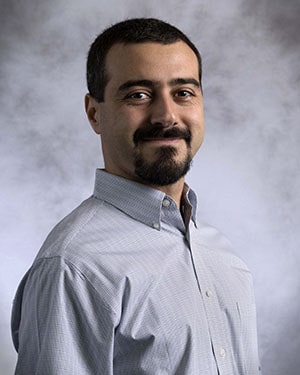

Unal "Zak" Sakoglu, B.S., M.S., Ph.D.
Associate Professor of Computer Engineering,
College of Science and Engineering
Contact number: 281-283-3813
Email: sakoglu@uhcl.edu
Office: Delta 111
Biography
Dr. Unal "Zak" Sakoglu is an associate professor of computer engineering. He holds
M.S. & Ph.D. degrees in electrical and computer engineering from University of New
Mexico (UNM), Albuquerque, NM. His graduate research involved developing signal/image
processing, non-uniformity modeling and correction algorithms for better multi-/hyper-spectral
sensing.
Dr. Sakoglu completed his post-doctoral training at UNM Neurology Department BRAIN
Imaging Center, and Mind Research Network in Albuquerque, where he developed and applied
data analysis & classification techniques to functional magnetic resonance imaging
(MRI) data. Subsequently, he worked as Research Scientist at UT-Southwestern Medical
Center Neuroradiology Department, Abbott Laboratories Global Pharmaceutical R&D Translational
Neuroimaging Group, and UT Dallas School of Brain and Behavioral Sciences.
During these appointments, he analyzed different modalities of medical imaging data
such as PET/CT, SPECT/CT, MRI and fMRI. His recent and current research spans development
and application of dynamic multivariate pattern classification, data-mining and machine-learning
methods to functional neuroimaging data in order to advance the understanding of how
the human brain is functioning and how it is effected by different brain conditions
or diseases. He is also working on developing better signal mapping, simulation and
visualization techniques for improved dynamic analysis and classification of multidimensional
data, including new sampling methodologies such as space-filling curves and hexagonal
sampling.
Dr. Sakoglu's research has been supported by grants from the DOD, AFOSR/AFRL, and
private industry; he was awarded summer faculty research fellowships at AFOSR/AFRL
multiple times.
Areas of Expertise
- Signal processing
- Image processing
- Machine learning
- Pattern recognition
- Medical imaging
- Remote sensing
Publications
Selected Recent Publications:
- Sakoglu U, "An Algebraic Nonuniformity Correction Algorithm for Hexagonally-Sampled Infrared Images: A Simulation Study," Proceedings of the IEEE Annual International Conference on Image Processing (ICIP), September 2021 (2021).
- LeVan P and Sakoglu U, "Methane gas leak quantification employing infrared sensing at suspected leak sites," Proceedings of the Society for Optical Engineering's (SPIE) Annual Infrared Sensors, Devices and Applications Conference XI, SPIE Annual International Optics+Photonics Meeting, San Diego, CA, August 2021 (2021).
- Sakoglu U, "Algebraic nonuniformity correction for infrared imagery using a hexagonal coordinate scheme," Proceedings of the Society for Optical Engineering's (SPIE) Annual Infrared Sensors, Devices and Applications Conference XI, SPIE Annual International Optics+Photonics Meeting, San Diego, CA, August 2021 (2021).
- Subasi A, Tuncer T, Dogan S, Tanko D, Sakoglu U, "EEG-based emotion recognition using tunable Q wavelet transform and rotation forest ensemble classifier," Biomedical Signal Processing and Control Journal, Vol 68, pp. 9102648 1--6 (2021).
- Sakoglu U, Bhupati L, Petrenko O, Calhoun VD, "Adaptive space-filling curve for improved feature selection from fMRI brain activation maps: application to schizophrenia classification," Proceedings of the 29th Annual Meeting of International Society of Magnetic Resonance in Medicine (ISMRM), May 2021 (2021).
- Cetin O., Seymen V., Sakoglu U, "Multiple sclerosis lesion detection in multimodal MRI using simple clustering-based segmentation and classification," Informatics in Medicine Unlocked Journal, Vol.20, 100409 1-10, Elsevier (2020).
- Sakoglu U, Minton M, “Development of an algebraic nonuniformity correction algorithm for hexagonally-sampled infrared imagery,“ Proceedings of the Society for Optical Engineering's (SPIE) Annual Infrared Sensors, Devices and Applications Conference X, SPIE Annual International Optics+Photonics Meeting, San Diego, CA, August 2020 (2020).
- LeVan P, Sakoglu U, “Infrared sensing technologies assisting environmental monitoring,“ Proceedings of the Society for Optical Engineering's (SPIE) Annual Infrared Sensors, Devices and Applications Conference X, SPIE Annual International Optics+Photonics Meeting, San Diego, CA, August 2020 (2020).
- Sakoglu U, Bhupati L, Beheshti N, Tsekos N, Johnsson J, “An Adaptive Space-Filling Curve Trajectory for Ordering 3D Datasets to 1D: Application to Brain Magnetic Resonance Imaging Data for Classification,” Lecture Notes in Computational Science (LNCS), Springer, Vol. 12139, pp. 635-646 (2020).
- Sakoglu U, Mete M, Esquivel J, Rubia K, Briggs R, Adinoff B, “Classification of Cocaine Dependent Subjects with Dynamic Functional Connectivity from Functional Magnetic Resonance Imaging Data,” Journal of Neuroscience Research, Wiley, Vol. 97(7), pp. 790-803 (2019).
Courses (Current Academic Year)
Selected Courses Taught:
- Linear Circuits
- Analysis and Design of Linear Systems
- Machine Learning and Applications
- Digital Signal Processing
- Digital Image Processing
Research Projects
Dr. Sakoglu's recent and current research spans development and application of dynamic multivariate pattern classification, data-mining, and machine-learning methods to functional neuroimaging data in order to advance the understanding of how the human brain is functioning and how it is effected by different brain conditions or diseases. He is also working on developing better signal mapping, simulation, and visualization techniques for improved dynamic analysis and classification of multidimensional data, including new sampling methodologies such as space-filling curves and hexagonal sampling.
Awards and Accomplishments
Selected Achievements:
- 2020-2021 UHCL Nominee for the M. S. Piper Teaching Award.
- 2019-2020 UHCL Finalist for the M. S. Piper Teaching Award.
- National Computational Science Institute (NCSI) Extreme Science and Engineering Discovery Environment (XSEDE) Expert Mentoring Producing Opportunities for Work, Education and Research (EMPOWER) grants, Spring, Summer, Fall 2020 and Spring 2021.
- Co-PI, U.S. Department of Defense (DOD), Congressionally Directed Medical Research Program (CDMRP), Research Grant for project “Exploring Mechanisms Underlying Impaired Brain Function in Gulf War Illness through Advanced Network Analysis,” 09/2016 – 07/2018.
- Summer faculty research fellowships, AFOSR/AFRL, 2015, 2016, 2017, 2018.






